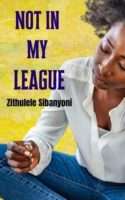Those left of Mmeli and Manqoba’s men clash at the centre of the battleground. There are screams, yells, grunting. Blood is spilled again and again
Manqoba orders his commander to open a space at the centre, and he calls another to bring him a stallion and a torch. Manqoba climbs onto the horse, raises his torch, and shouts: “Let’s take back our village!”
As Mmeli is fighting Manqoba’s soldiers he looks up. He sees a Zulu charging down the hill on his horse. As he comes closer, Mmeli sees the rider is Manqoba! He calls a few men.
“Follow me!” They run to the to the village’s rear entrance, where they crouch down as Mmeli tells them his strategy.
Manqoba swerves through the fighting men, weaving between them, going straight to the entrance. Mmeli’s men put up their shields to form a barricade. “Stand firm!” shouts Mmeli.
Manqoba sees their defence, but doesn’t flinch. He kicks the horse to go faster. As Manqoba rides straight at them without any sign of slowing down, some of Mmeli’s men become nervous. Now Manqoba is just a stone’s throw away from the barricade; some men are frightened and they run for cover.
Mmeli and the few who remain standing know they are not enough to stop Manqoba. He rides through them; they are sent flying sideways. He charges through the village’s entrance, the flaming torch in his hand.
Mmeli watches Manqoba’s route and a thought strikes him: “the Nkosi!”
Manqoba rides past each row of huts in the settlement, nearer and nearer to the Nkosi’s hut. There is one thought in his mind. As he is riding, passing, passing, passing each row of huts … coming closer to the Nkosi’s kraal, his eyes are dead, focused on one thing: the Nkosi’s chambers. He’s near enough now; he raises his arm skywards with the torch, ready to hurl it.
Just then his horse crashes down to the ground; he goes with it. Moments pass before Manqoba regains consciousness, and searches around him. Who did this? From the corner of his eye, he sees the Nkosi’s wide-eyed young steward, Ifalakhe, standing, frozen in terror.
In a moment of bravery Ifalakhe had hurled a spear into Manqoba’s horse.
Manqoba looks at him, enraged. He leaps up and goes for Ifalakhe, but as he is about to reach him he hears Mmeli shout behind him: “Stop!”
Turning his head, Manqoba sees Mmeli, and mocks him, “Oh … the new Nkosi!”
“Stop this madness, Manqoba!”
Manqoba just smirks and walks back to the dying horse. He rips the spear out of its side. He breaks it in half, so that it is the size of an assegai. “That’s better,” he says. “Remove your shield; I don’t have one. Fight like a man!”
Mmeli remains silent.
Manqoba grins and runs towards Mmeli. The fight is fierce. Manqoba is quick and agile. Mmeli is strong and defends. Both fight to their own strengths. In the midst of the showdown, Manqoba ducks and is struck. Mmeli blocks and gives Manqoba a fearsome kick. Manqoba’s spear is jolted from his grip as he flies through the air landing on his dying horse. Mmeli lunges forward to end the battle. Manqoba stops him.
“Do you know why I win?” Manqoba says. “It is not just my brute strength – I am clever, Mmeli.” He grabs his half-extinguished torch and unexpectedly launches it at Mmeli’s face.
“Argh!” Mmeli cries out in agony, gripping his face.
Manqoba laughs and taunts him with blows to the body. Once Mmeli is on the ground, Manqoba looks around and sees something that makes him smile. He picks up the Nkosi’s iklwa. He admires its beauty and walks back to the kneeling, whimpering Mmeli.
Manqoba stands next to him, lifts the iklwa and says: “What irony – you die from what was bestowed on you!”
Mmeli cries for the Nkosi’s rescue, but with no response. Manqoba just smiles, takes firm hold of the iklwa in both hands, and raises it to sky, ready to plunge it into Mmeli.
Manqoba proclaims his last words: “Prepare yourself. Lunga will be joining you soon!”
Mmeli, desperate through the burning pain, sees and grabs for a spear half covered in dust, and like lightning thrusts it into Manqoba’s stomach.
The dazed Manqoba crashes backwards onto the horse again. Mmeli takes the iklwa and marches straight to Manqoba, intending to kill him.
As he reaches Manqoba, is about to deliver the deathblow, he is stopped. “No!” the Nkosi’s voice booms out.
Mmeli looks shocked. “My Nkosi, what do you mean?”
“Leave him, my servant.”
Mmeli, in disbelief, refuses to hear, to believe, the Nkosi’s command.
“No. I don’t understand. Not now.” Mmeli struggles with tears rushing down his face. The Nkosi’s command is more painful than the burn on his face. He falls down to his knees crying. Manqoba looks at him out of bloodshot eyes.
The Nkosi stands watching them as one of the soldiers comes running. “My Nkosi, we have subdued the enemy. The men are bringing them.”
The defeated men, and Ndaba kaPhinga and the village survivors arrive. All wait for the Nkosi to deliver judgement on the defeated.
The Nkosi stands silent. Then he pronounces, and they are all struck dumb by the judgement: “Let them go. Take your Nkosi and leave!”
Ndaba kaPhinga rushes to the Nkosi’s side. “My Nkosi, what is the matter? Your men just fought, and lives were spent. Please reconsider your decision.”
“Let them go.”
The victorious men look at each other with disbelief, some dazed and others frustrated.
“Whoever wants to leave with them, may leave with them,” the Nkosi says.
The defeated lift Manqoba and make their way from the village. Then suddenly some of the Nkosi’s men start to drop their iklwas, one by one, and follow Manqoba’s defeated men. Ndaba kaPhinga looks on in amazement at the men abandoning their Nkosi.
Mmeli is still kneeling down in agony, face on the ground. Nkosi looks at Mmeli and asks him if he wants to leave.
“No,” grunts Mmeli. Then the Nkosi turns around and goes back to his chambers.
Mmeli is still down, when a young boy comes running to him. The child tells Mmeli to come quickly – Mbali is having her baby.
Mmeli rises up, his pain forgotten, and rushes with the child to the delivery. Midwives stop Mmeli from entering the hut, but once a cry comes out, he is allowed to go in.
Entering the dimly lit, cool room he sees Gogo and Lunga, plus the midwives, encircling Mbali. She is lying, cuddling a new baby whose crying brings delight to the room.
Mmeli slowly approaches the woman and child. Mbali hands the wrapped child to her husband. He takes the baby tenderly.
“What is it?”
“It is a boy.”
“A boy, my legacy. What shall we call him?”
“Thembalethu (our hope),” Mbali whispers.
“Thembalethu, my legacy!” shouts Mmeli. Everyone cheers and rejoices, and the joy spreads through the village.
The next day all assemble at the Nkosi’s kraal and he summons Mmeli and Ifalakhe to the front.
“Ifalakhe, you’re like a son to me. Everyone has fear, but few can confront theirs and you are one of the brave few. Here is my iklwa, for your bravery and valour.” Joyfully Ifalakhe runs straight to his family, showing them what the Nkosi has given him.
The Nkosi continues: “For you Mmeli, nali ihawu lami (here is my shield). You are my protection, you have loyalty, you change not, like stone, and you are as tough as stone is. You are like my shield; it is fitting that you have it. Here.”
The Nkosi addresses the whole village.
“I thank you all. You stood by me in my testing hours. You stood for the village when it seemed bleak. I greatly thank you for standing for what I believed in, what I loved. So village of Umlazi, I personally thank you for your dedication, perseverance and your steadfastness. Let us rejoice, for today I won. Today we won!”
All the villagers of Umlazi shout, rejoice and celebrate.
Mmeli goes back through the crowd to his wife Mbali, to Gogo, Lunga and Thembalethu. He hugs them all, and finally kisses Mbali.
Everyone is happy and dancing. Especially Magigithela.
***
Tell us: What do you think of the Nkosi’s mercy towards the traitor Manqoba. Foolish or wise? Why? The story is called ‘The Greatest Battles are Within?’ Do you agree? Why?



